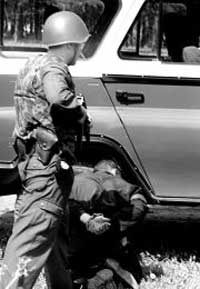Property confiscation retrieved in Russia
Confiscation of property was abolished in Russia at the end of 2003 after adoption of presidential amendments on the issue

On February 2, mass media reported that confiscation of property would be soon as radical as it was a couple of years ago. The measure was abolished not long ago, and many people were not even aware of the abolishment until it was declared confiscation would be retrieved. 
On February 1, The Kommersant reported that according to the presidential amendments to the Tax and Penal Codes, confiscation of any property would be imposed as punishment for any crimes.
Confiscation of property was abolished at the end of 2003 after adoption of presidential amendments on the issue. Instead, a special confiscation was introduced and it is still in force. This means confiscation of property used for committing crimes or that one obtained as a result of the crime. All over the world, the measure is applied as punishment for money laundering, financing of terrorism and drug trafficking; in Russia, the measure is applied wider for stealing and inappropriate spending of governmental funds.
In previous years, it turned out that the measure was not effective and, as a result, was abolished. Indeed, people in Russia usually register illegally obtained property as belonging to their close or distant relatives, or acquaintances.
In fact, confiscation of property was substituted with a fine amounting to about one million rubles. However, it turned out that innovation was not enough. Head of the General Prosecutor Office's department overseeing participation of prosecutors in investigation of criminal cases, Oleg Ankudinov says that “courts sentence officials involved in economic crimes and smuggling to suspended sentences and a fine at the rate of tens or hundreds of thousands of rubles. Is it a drastic measure for a governmental official who accepts bribes in millions of dollars?”
Duma deputy Yeugeny Roizman sticks to a similar position and says: “Abolishment of confiscation of property made Gypsies in Russia especially happy. They knew they would not lose cottages built thanks to drug trafficking.”
Half a year after abolishment of confiscation, Deputy Prosecutor General Sabir Kekhlerov suggested confiscation of property must be again introduced as a Criminal Code punishment for corruption. At that time, the initiative sounded too undemocratic. But the public opinion radically changed after the Beslan tragedy in September 2004 when President Putin urged for fighting the financial and economic basis of terrorism and corruption.
At parliamentary sessions devoted to the confiscation problem, Prosecutor Office's representatives proposed introduction of confiscation as a measure applied to corrupt officials and terrorists. At that, it was suggested that only illegally obtained property must be confiscated from corrupt officials, while terrorists must be deprived of any property that investigation discovers.
The Prosecutor Office's experts insist that people prosecuted for crimes must prove their property is legal. But the initiative was rejected as contradicting the presumption of innocence principle. What is more, the Prosecutor's Office thinks it makes sense to introduce criminal responsibility for companies as well. In other words, in case management of some company employs illegal methods for making money, not only their private property but also company assets may be confiscated. It is not ruled out that this innovation would have made the Yukos intrigues simpler.
Recently, Chairman of the Duma commission for counteraction to corruption Mikhail Grishankov implied in an interview to the Rossiiskaya Gazeta newspaper that soon the notions of “illegal enrichment”, “confiscation of property” and “corruption attributes” would be given the status of the law.
According to The Kommersant, now confiscation of property will have wider usage. From now on, not only illegally obtained money or property must be confiscated, but also the profits that illegally obtained property brings; and also property which suspects handed over to other people in case these people guessed the property was illegally obtained.
In other words, now confiscation of property is revived as a much more drastic measure. This is the only way to fight corruption, the Prosecutor's Office supposes. Russian Federation Prosecutor General Vladimir Ustinov says that “otherwise, the economic side of crimes will be profitable for corrupt officials. Confiscation of property must be revived because Russia signed the UN Anti-corruption Convention.” Mikhail Grishankov mentions the Council of Europe anti-corruption convention in this connection.
Immediately after the Kommensant publication, deputies declared that the initiatives mentioned in the economic edition had not been approved by the president. Deputy chairman of the Duma committee for budget and taxation Andrey Makarov said about that in his live appearance on Echo Moskvy radio. At the same time, Makarov admits that it was declared the initiatives were submitted by the president; however he believes the idea is somebody's voluntarism. Andrey Makarov is an attorney; it is known that Russian attorneys do not approve of reviving confiscation. The initiatives have already won numerous supporters as well as opponents. The president will have to listen to arguments of both sides.
An express opinion poll conducted by Echo Moskvy radio reveals that 57 per cent of opponents support reviving of confiscation, while 43 per cent say people committing crimes should not be confiscated of their property.
Sergey Malinin
Subscribe to Pravda.Ru Telegram channel, Facebook, RSS!


